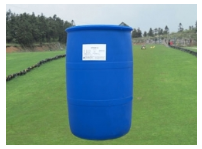Anionic surfactants have excellent performance in decontamination, but they are often combined with non-ionic surfactants to get better deinking effect. The anionic surfactants have good foaming and degreasing properties. The nonionic surfactants present nonionic state in aqueous solution and have high stability. When the non-ionic surfactant and the anionic surfactant are used together, the colloidal particles are negatively charged and repel with electricity, forming a stable dispersion system, which is conducive to the separation and removal of ink and fiber.
Leather Fatliquoring is to add grease into the skin, which is used to form a single molecular layer oil film on the surface of collagen fiber, and also to absorb a certain amount of grease between fibers, so as to prevent the fiber from binding and hardening, making the fiber molecular chain and chain segment movement very easy, so as to improve the softness and fullness of leather, and prevent the skin from being stiff or even cracking. So fatliquoring is an important process in leather making.

Filling is divided into wet filling and dry filling, which mainly refers to wet filling. The so-called wet filling refers to putting the leather before and after fatliquoring into the bath solution of the filling agent, and the filling agent penetrates into the leather fiber and fills the leather fiber or adsorbs around the leather fiber, so as to make the leather firm, plump, increase the elasticity and effectively overcome the loose surface and reduce the position difference. The role of surfactants in the filling process is to help penetration and diffusion.
Paper is an important packaging material. With the increasing demand of paper and paperboard, it is bound to cause the shortage of raw materials and energy. Due to the limited forest resources and the shortage of water resources in our country, it can not meet the needs of the paper industry. Therefore, in the era of advocating ecological civilization and circular economy, the recycling of waste paper and paper products is very important.
Around the world, 54% of waste paper is used as cardboard, 15% as packaging paper, 12% as newsprint, 10% as toilet paper, and 7% as printing and writing paper. Waste paper making can save complex processes such as wood material preparation, cooking and bleaching. The key to the utilization of waste paper is the deinking technology. Surfactant is the main active component in the deinking of waste paper. In this paper, the performance of different surfactants is compared and selected, and it is applied to the deinking of waste newsprint by chemical washing method, and the appropriate process is discussed.